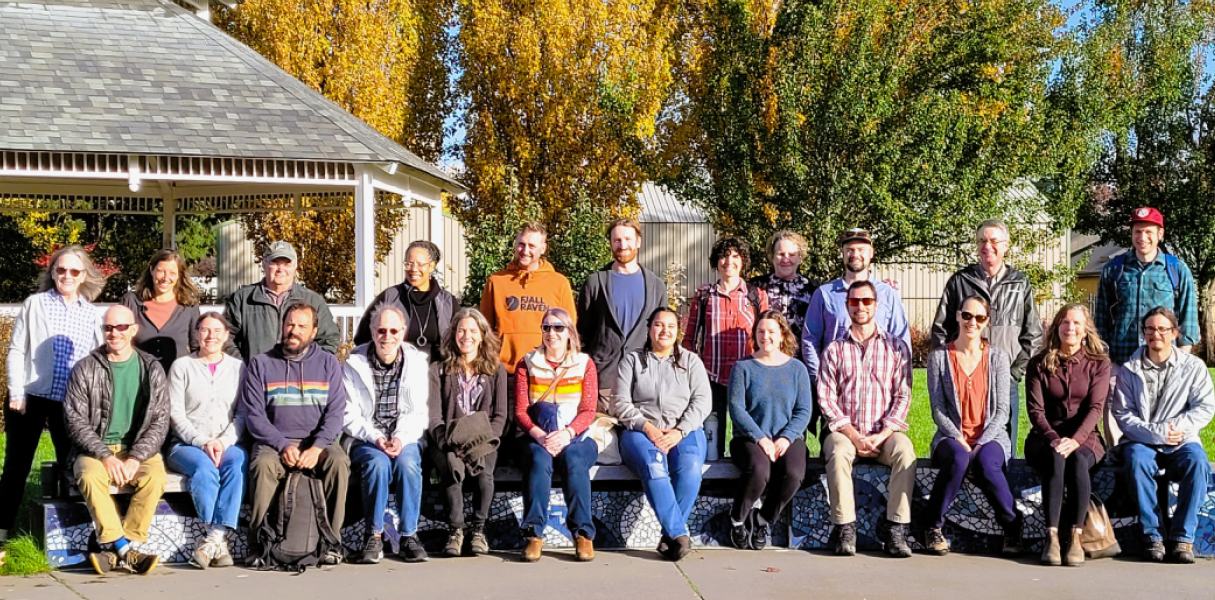
Our Team
Our Advisory Board
INR and the Institute for Water and Watersheds (IWW) share an advisory board. The INR-IWW advisory board is comprised of members representing Oregon's public universities; federal, state and local government; private industry; and/or non-governmental organizations. The board is instrumental in helping us develop strategic actions and identifying key focus areas.
Advisory Board Members
Tom DeLuca, Dean, College of Forestry, Oregon State University
Cass Moseley, Senior Associate Vice President for Research and Innovation, University of Oregon
David Newton, President, Newton Consultants, Inc.
Sarah Reif, Habitat Division Administrator, Oregon Department of Fish and Wildlife
Todd Rosenstiel, Associate Dean, College of Liberal Arts and Sciences, Portland State University
Our Community
Our Community
Partners and Collaborators
Oregon’s natural resource agencies, policy makers, natural resource stewards, scientists, educators, students and residents.
Engagement
The Institute for Natural Resources and the Institute for Water and Watersheds (INR-IWW) are engaged in a number of multi-agency and multi-institutional efforts.
State
- Governor’s Natural Resources Cabinet
- Oregon Geographic Information Council
- Integrated Water Resources Strategy
- Climate Change Adaptation Framework
- Department of Land Conservation and Development IMMI
- STREAM TEAM
- Sage Grouse Conservation Project (SageCon)
- Oregon Coast and Marine Data Network (OCMDN)
- Willamette Aquatic Invasives Network (WAIN)
Federal and Regional
- Pacific Northwest Cooperative Ecosystems Study Unit
- Colorado Plateau Cooperative Ecosystems Study Unit
- U.S. Geological Survey External Research
- U.S. Geological Survey State Water Resources Research Institute Program
- U.S. Army Corps of Engineers Institute for Water Resources
- Integrated Data Management Network
- Western Invasives Network (WIN)
National
- Internet of Water
- National Natural Heritage Program Network
- National Institutes for Water Resources
- Consortium of Universities for the Advancement of Hydrologic Science (CUAHSI)
- DataONE
- USGS Protected Areas - US
- National Park Service Vegetation Inventory
- National Ecosystem Services Partnership
International
- iMapInvasives
Opportunities within INR
Opportunities within INR
Current Opportunities
INR provides opportunities through Oregon State University and Portland State University. For current opportunities:
- INR-OSU posts employment recruitment on the OSU Jobs Website, and
- INR-PSU posts employment recruitments on the PSU Jobs Website.
Riparian and Wetland AIM Positions
INR is hiring seasonal positions for Riparian and Wetland Assessment, Inventory, and Monitoring (AIM) fieldwork for the 2024 season across BLM districts in the western U.S. Positions are open for a Riparian and Wetland Botanist and a Riparian and Wetland Soils and Hydrology Technician. Please see the announcements for details and how to apply.
Lotic AIM Seasonal Positions for 2024 Now Hiring
INR is hiring seasonal positions for Lotic Assessment, Inventory, and Monitoring (AIM) fieldwork for the 2024 season in Oregon and California. Details and instructions on how to apply can be found in the position announcements: CA Lead Announcement, OR Lead Announcement, CA Technician Announcement. Open until filled. Questions and applications can be directed to Andrew Christensen, project manager, at [email protected].
Terrestrial AIM Seasonal Positions for 2024 Now Hiring
INR is hiring seasonal positions for Terrestrial Assessment, Inventory, and Monitoring (AIM) fieldwork for the 2024 season in Oregon, Washington, and California. Details and instructions on how to apply can be found in the position announcements: Crew Member, Crew Lead, and Team Lead. Positions begin in April and will be open until filled. Please apply on the OSU website, and direct any questions to Caitlin Lawrence.
Faculty and Staff Positions
Positions will be posted to the PSU and OSU job boards when available.
Student Positions
We occasionally have paid student positions open at our INR-OSU and INR-PSU offices. You must be enrolled as a student and taking either 6 or more undergraduate credits or 5 or more graduate credits to be eligible. Student positions are posted on PSU's Handshake careers site and at the OSU Jobs Portal.
Volunteering and Internships
We are always looking for volunteers; if you are interested, please contact us. PSU students may be eligible for course credit.
National Science Foundation Undergraduate Fellowships
In two NSF projects, INR is involved in the projects' broader impacts initiative through two fellowship programs:
- The Cascadia Coastline and Peoples Hazards Research Hub, or Cascadia CoPes Hub (2022-2027), is a team of researchers funded by the National Science Foundation to increase knowledge about natural hazards and climate change risks coastal communities face and ways to increase their resilience. The Hub is working with communities in the Pacific Northwest, including Washington, Oregon, and Northern California to increase their ability to mitigate and adapt to impacts from hazards like “The Really Big One”- a mega-earthquake, tsunamis, sea level rise, landslides, erosion, and climate change. The Cascadia Coastal Hazards and Resilience Training, Education and Research, or CHARTER, program offers formal and informal training, education and hazards science research across the middle school, high school, undergraduate, graduate, and postdoctoral levels. The CHARTER Fellows Program provides a unique opportunity for undergraduate students to engage with CoPes Hub research and conduct research, act as role models for high school students, and engage with the public around the science of coastal hazards.
-
The FireNet: Adaptation through Collaboration project (2020-2024) is an interdisciplinary team of scientists examining the social and biophysical mechanisms that shape the capacity of people in fire-prone landscapes to cope with and adapt to intensifying disturbance regimes. The SES Undergraduate Fellows Program. The fellows are supported through: (1) an orientation to the program and wildfires; (2) 5-session qualitative research methods course; (2) a 3-day SES Boot Camp in Bend, Oregon; (3) year-long learning, skill-building, networking, and engaging in research opportunities; and (4) mentoring by Dr. Dwaine Plaza and Dr. Lisa Gaines.




